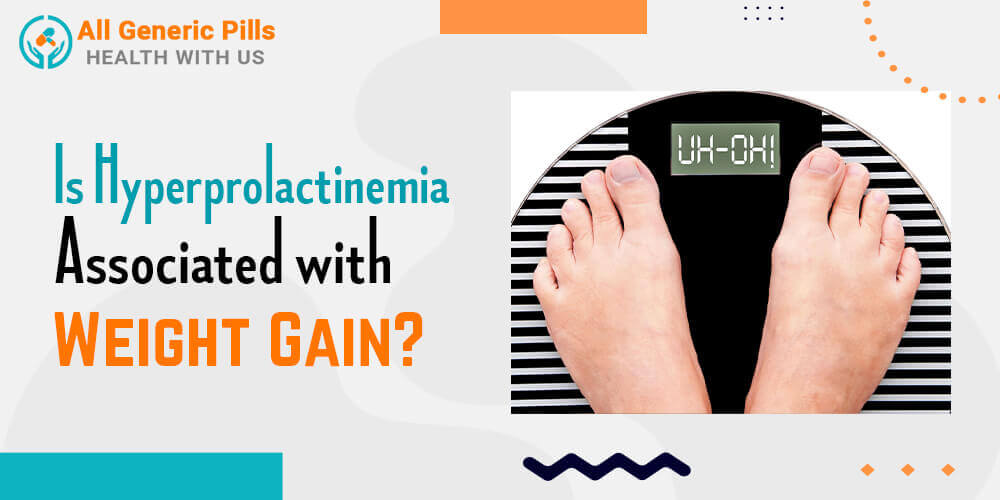Sorry, nothing in cart.

Is Hyperprolactinemia associated with Weight Gain?
Description: Hyperprolactinemia is the excessive release of prolactin by the pituitary gland of both men and women. For females, prolactin release helps develop breasts and produce milk for breastfeeding and in men, it is used for creating sex hormones. However, when release crosses the safety margin, it causes weight gain, unusual changes in liquid profile, and cardiovascular diseases.
A human body comprises a certain level of prolactin when talking about non-pregnant, pregnant women, and males. So, we have the following prolactin levels for each kind:
- Non-pregnant women – 2-29 nanograms per milliliter
- Pregnant women – 10-209 nanograms per milliliter
- Males – 2-18 nanograms per milliliter
So, the above-mentioned levels are normal for humans, however, when there is a rise, we catch several diseases which require complete treatment.
The causes of hyperprolactinemia can be non-pregnant women producing milk in their normal days or women finding difficulty in getting pregnant, a male cannot produce enough sex hormones for a satisfying sexual life, loss of libido, enlarged breasts, or they also produce breast milk.
This article will help you understand the association between hyperprolactinemia and weight gain, the symptoms that cite this association, and also the treatment for hyperprolactinemia in detail.
What Happens in Hyperprolactinemia?

Symptoms in females:
Hyperprolactinemia infertility
Loss of sex desires
Pain breast
Chest pain
Vaginal dryness
Irregular menstruation
Break-in menstrual cycle
Galactorrhea
Symptoms in Males:
Hyperprolactinemia infertility – less or no sperm production or the deficiency in producing testosterone (by disrupting 17-b-estradiol synthesis in men)
Headaches or lightheadedness
Blurred Vision
Loss of Libido
Erectile Dysfunction
Galactorrhea (rare cases)
Other Symptoms of Hyperprolactinemia include the following:
- Galactorrhea: Non-pregnant women or men secreting milk. It occurs in 30% of cases, however, in men, it is a rare case.
- Primary or secondary amenorrhea: menopause stage before the set time
- Headaches and visual field alterations or double/blurred vision. This symptom is caused by tumors.
- Hirsutism occurs when a woman is suffering from PCOS or hyperandrogenism.
- Osteoporosis – In cases of hypogonadism.
- Decreased libido (in both men and women), and dry vagina.
- Infertility is caused by chronic anovulation.
Hyperprolactinemia and Weight Gain – Causes and Effects

The pervasiveness of obesity is expanding overall and it is liable for expanded morbidity and mortality, essentially because of cardiovascular infection and disease A few endocrine problems are known to be connected with the pathogenesis of stoutness, such as Cushing’s condition, hypothyroidism, hypogonadism, and development chemical (GH) lack. Prolactinoma has been as of late related to corpulence and its confusions like metabolic disorder (MS) and insulin obstruction.
A few reports portrayed higher body weight in people, particularly in men with macroprolactinoma, and in people with hyperprolactinemia; notwithstanding, the components basic to this affiliation are ineffectively perceived. A few doctors suggest that weight reduction in people happens after complete or approach standardization of serum prolactin (PRL) with dopamine agonists (DAs). Conversely, creatures’ examinations uncovered no impact on weight and muscle versus fat circulation with changes in PRL levels.
Also, the job of PRL in glucose digestion of patients with prolactinoma is muddled. Concentrates on in people have connected hyperprolactinemia to glucose narrow-mindedness and hyperinsulinemia. The speculations are the association of PRL on islet β-cell development, improvement, and separation, and on insulin creation/emission. Besides, PRL can control the creation/discharge of adiponectin and cause changes in insulin digestion.
The PRL activity on lipid digestion is additionally not deep-rooted. PRL might straightforwardly affect fat tissue. Ling et al. exhibited an impact of PRL in diminishing the lipoprotein lipase movement in human fat tissue resulting in an expansion in fatty oil (TG) levels.
The motivation behind this study was to decide the pervasiveness of stoutness/overweight, MS, and IR when treatment of patients with prolactinoma with bromocriptine (BRC) or cabergoline (CAB), and to assess the connection among PRL and body weight, fat appropriation, leptin levels, IR, and lipid profile before treatment. We additionally researched whether PRL decrease is related to weight reduction and improvement in the metabolic profile.
The reason for weight gain because of hyperprolactinemia can be as follows:
- Decrease in dopaminergic tone
- Leptin resistance
- Rising hypothalamic pressure
- Hypogonadism
- Disruption of the central nervous system
However, there is no surety whether hyperprolactinemia and weight gain are associated with each other or not.
How to Diagnose Hyperprolactinemia?

The diagnostic test is done to check the prolactin levels in the blood and the test must be done on the third and fifth day of the menstrual cycle (as it is the stage when ovaries are at rest and hormones are at the basal level).
If the prolactin level in the blood is beyond 30 nanograms per milliliter, it is hyperprolactinemia and if in a case, the level lies between 20 and 40 nanograms milliliter, then the test is repeated to confirm the diagnosis.
Also, it is imperative to know the patient’s medical history to determine the hormonal disturbances. Pregnancy needs to be ruled out when getting this test done.
Eventually, it is also important to rule out the residence of any pituitary tumor by using computed tomography (CT) or MRI to check if hyperprolactinemia is associated with hypothyroidism.
How to Treat Hyperprolactinemia?

Following are the treatment choices for prolactinomas (the most well-known reason for hyperprolactinemia):
- Drug: Medications such as Cabergoline and bromocriptine (Parlodel) can control your prolactin levels and are exceptionally successful in contracting prolactinoma cancers. This is the most well-known type of treatment for prolactinomas.
- Surgery: If a drug isn’t attempting to contract your prolactinoma, you might have to have a medical procedure to eliminate it.
- Radiation treatment: This is an intriguing third choice for treating prolactinomas if prescriptions, as well as a medical procedure, don’t attempt to decrease your prolactin levels.
In our context, we considered that hyperprolactinemia is the reason for weight gain in adults. Also, we stated that normalization of prolactin (PRL) levels results in weight loss. However, the nature of this link is hard to define.
